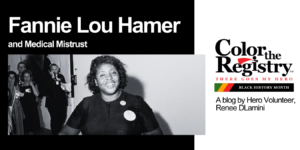Fannie Lou Hamer and Medical Mistrust
There have been pivotal moments in American history. One of these was marked by significant change and uprising within the Black and African American community. It was a time that reflected transformation in the minds of a people who had been oppressed for far too long. Spanning over a decade, this change resulted in mass protests and organized efforts to resist racial injustice and dismantle systemic discrimination. As a result, an awakening came in the form of the Civil Rights Movement. Before this, Black and African Americans were trapped in a cycle of ongoing denial of their human rights and oppression. They worked tirelessly to secure the protection of these rights and broke barriers to achieve meaningful change.
Influential leaders emerged during the Civil Rights Movement, demanding justice and equality for African Americans. One of the most powerful and passionate voices of that era was a woman who rose from being a sharecropper to a prominent civil rights activist. We’re going to talk about how systemic injustice ignited the rise of Fannie Lou Hamer, a courageous advocate for voting rights and racial equality.
Fannie Lou Hamer was born in Mississippi on October 6,1917, as the youngest of 20 children in a sharecropping family. From the age of six, she began picking cotton. This is where she started to experience the realities of poverty and exploitation firsthand. After marrying Perry Hamer, the couple worked together on a plantation for 18 years.
A significant moment in Fannie Lou’s life occurred in 1961. During surgery intended to remove a uterine tumor, she received a hysterectomy, the removal of her womb. This was done without her knowledge or consent. This unethical practice was so prevalent in the South that Hamer herself coined the term “Mississippi Appendectomy”. She did this to shed light on the forced sterilization of Black women during that time.
The second significant incident occurred on June 9th, 1963. While returning from a voter registration workshop, Fannie Lou and several other activists stopped at a bus terminal and attempted to have lunch at a “whites-only” lunch counter. They were arrested, and while in jail, Fannie Lou and her colleagues were brutally beaten. Hamer suffered injuries to her eyes, legs, and kidneys as a result. These experiences motivated her to fight for justice, leading her to work with organizations like the Student Nonviolent Coordinating Committee (SNCC), which encouraged African Americans to exercise their right to vote.
The injustices faced by Fannie Lou highlights how such experiences can foster medical mistrust among African Americans toward the healthcare system. This unfair treatment has resulted in skepticism and hesitancy to participate in life-saving procedures, such as bone marrow donation.
In the last two blogs, we talked about informed consent and beneficence. In this blog, we will talk about the concept of justice, specifically focusing on procedural and restorative justice.
Procedural justice emphasizes the importance of trust, open communication, and respect. When procedural justice is upheld, you feel that your input is valued in the decision-making process regarding your treatment.
Restorative justice involves recognizing and acknowledging past harm, as well as understanding its impact on those affected. The goal is to engage meaningfully with individuals involved to reduce inequities, prevent future harm, and foster safe and welcoming environments. This approach addresses incidents of harm and wrongdoing in a sincere way.
Healthcare providers and organizations must uphold important principles, ensuring that you, as a patient, feel respected and heard. We mentioned organizations like DKMS that support these principles, and we encourage you to consider the important step of joining the Bone Marrow Donor Registry.
The key takeaways from Fannie Lou Hamer’s life regarding health care highlight that justice for African Americans extends beyond accessibility. It also includes the fair treatment, accountability, and respect for patient’s autonomy and basic human dignity.
Fannie Lou Hamer was instrumental in the voting rights of African Americans and fought tirelessly for this cause. Similarly, we encourage members of the African American community to join the Bone Marrow Donor Registry, as there is a dire need for better representation. While we reflect on the events of Black history, let us create a legacy of positive change. May this be a time of transformation for the Black and African American community affected by blood cancer.
Renee DLamini is a registered nurse with over 15 years of experience in healthcare. She combines her clinical knowledge with a passion for writing informative and engaging content.

